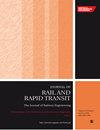Study on damage of CRTS II slab tracks in coated-uncoated transition zones subjected to temperature and train loads
IF 2.1
4区 工程技术
Q3 ENGINEERING, CIVIL
Proceedings of the Institution of Mechanical Engineers Part F-Journal of Rail and Rapid Transit
Pub Date : 2024-09-07
DOI:10.1177/09544097241281767
引用次数: 0
Abstract
The CRTS II ballastless track is sensitive to temperature due to its longitudinal continuity. The application of reflective insulation coating can efficiently lower the temperature of the track slab, thereby decelerating track deterioration. Given the considerable length of high-speed railway lines, the application of reflective insulation coatings leads to numerous transitions between coated and uncoated sections. This study investigates the influence of reflective insulation coatings on the structural damage of coated-uncoated transition zones in railways. To this end, a CRTS II slab track model involving the bilinear cohesive zone model and the concrete plastic damage model is established. The model examines the combined impact of high temperature and train loading, aiming to investigate the damage patterns within the coated-uncoated transition zone of the track. The results indicate: (1) During high temperature loading, the center of the track slab layer is predisposed to warping compared to the sides. (2) If the cohesion parameter falls below 0.04 MPa, augmenting the cohesion model parameter effectively alleviates track slab arching. (3) In instances where the track slab lacks complete coverage of reflective insulation coatings, train loading may shift the location of the maximum vertical displacement and interface failure mode.涂层-非涂层过渡区 CRTS II 板式轨道在温度和列车载荷作用下的损坏研究
CRTS II 无砟轨道由于其纵向连续性,对温度非常敏感。使用反射隔热涂料可以有效降低轨道板的温度,从而减缓轨道老化。由于高速铁路线的长度相当大,反射隔热涂层的应用会导致涂覆区段和未涂覆区段之间的大量过渡。本研究探讨了反光绝缘涂层对铁路涂层与非涂层过渡区结构损坏的影响。为此,建立了一个 CRTS II 板式轨道模型,其中包括双线性内聚区模型和混凝土塑性破坏模型。该模型研究了高温和列车载荷的综合影响,旨在探讨轨道涂层-非涂层过渡区内的损坏模式。结果表明:(1) 在高温荷载作用下,轨道板层中央比两侧容易发生翘曲。(2) 如果内聚力参数低于 0.04 兆帕,增加内聚力模型参数可有效缓解轨道板拱起。(3) 在轨道板没有完全覆盖反射隔热涂层的情况下,列车荷载可能会改变最大垂直位移的位置和界面失效模式。
本文章由计算机程序翻译,如有差异,请以英文原文为准。
求助全文
约1分钟内获得全文
求助全文
来源期刊

CiteScore
4.80
自引率
10.00%
发文量
91
审稿时长
7 months
期刊介绍:
The Journal of Rail and Rapid Transit is devoted to engineering in its widest interpretation applicable to rail and rapid transit. The Journal aims to promote sharing of technical knowledge, ideas and experience between engineers and researchers working in the railway field.
 求助内容:
求助内容: 应助结果提醒方式:
应助结果提醒方式:


